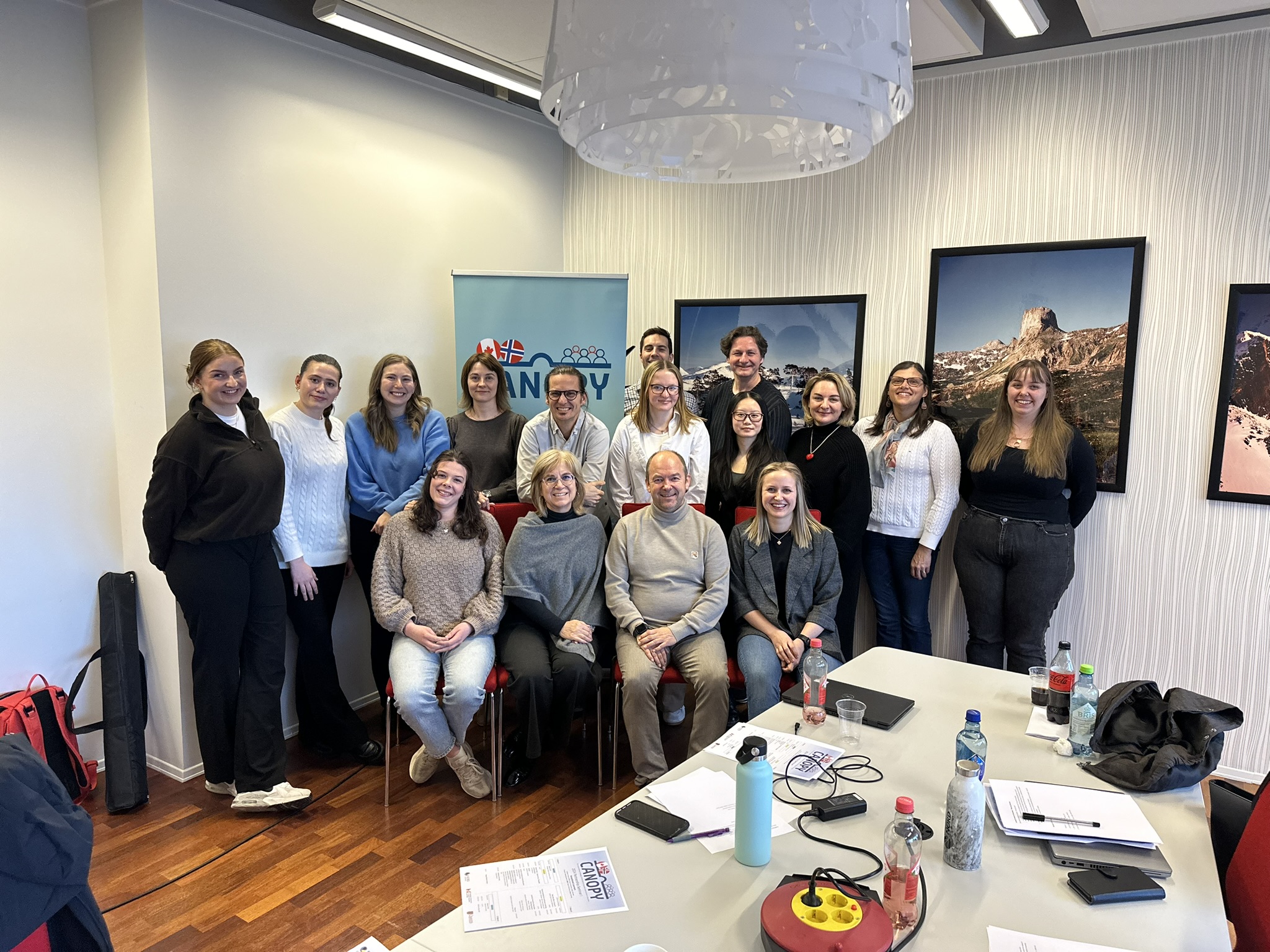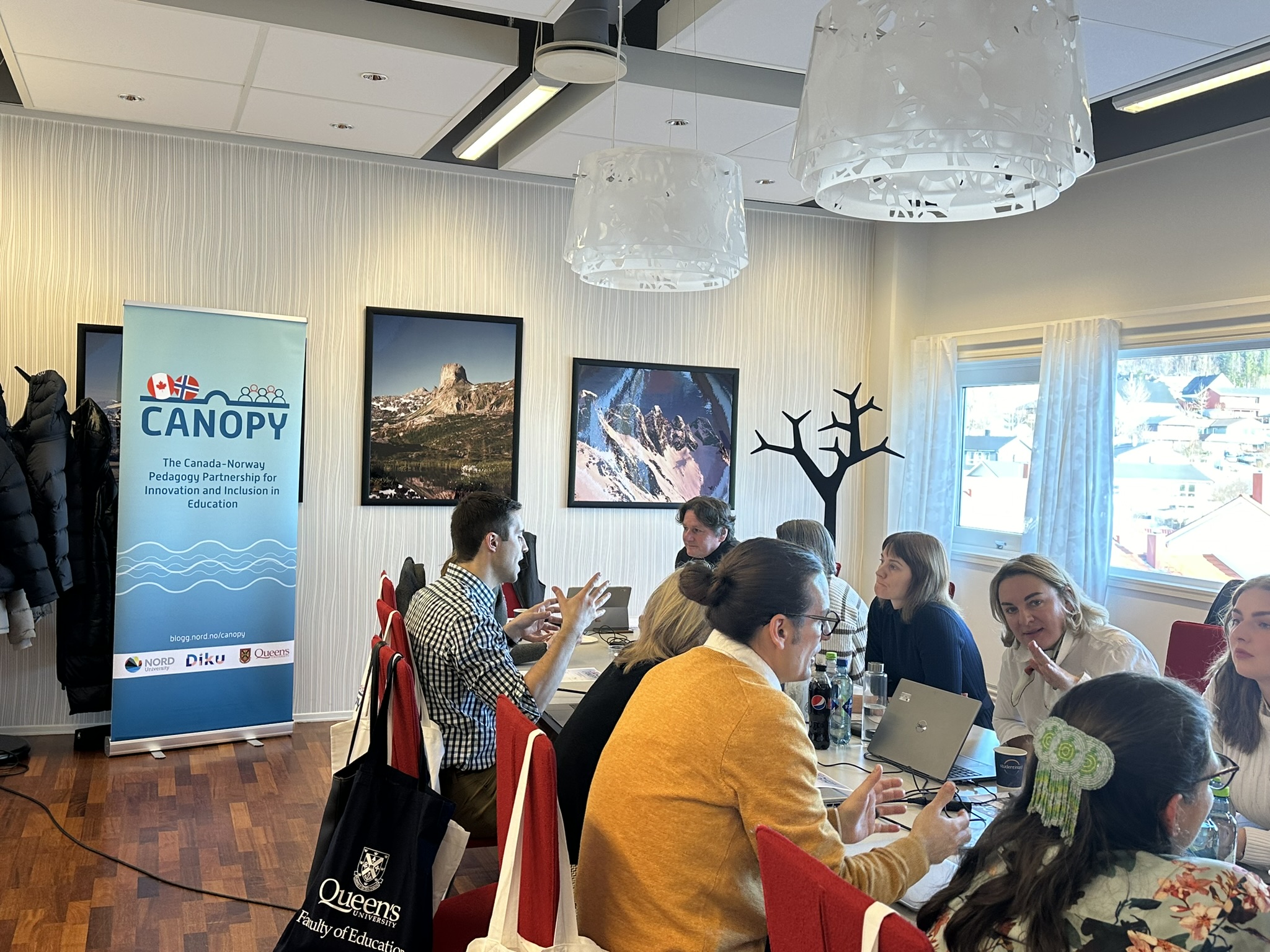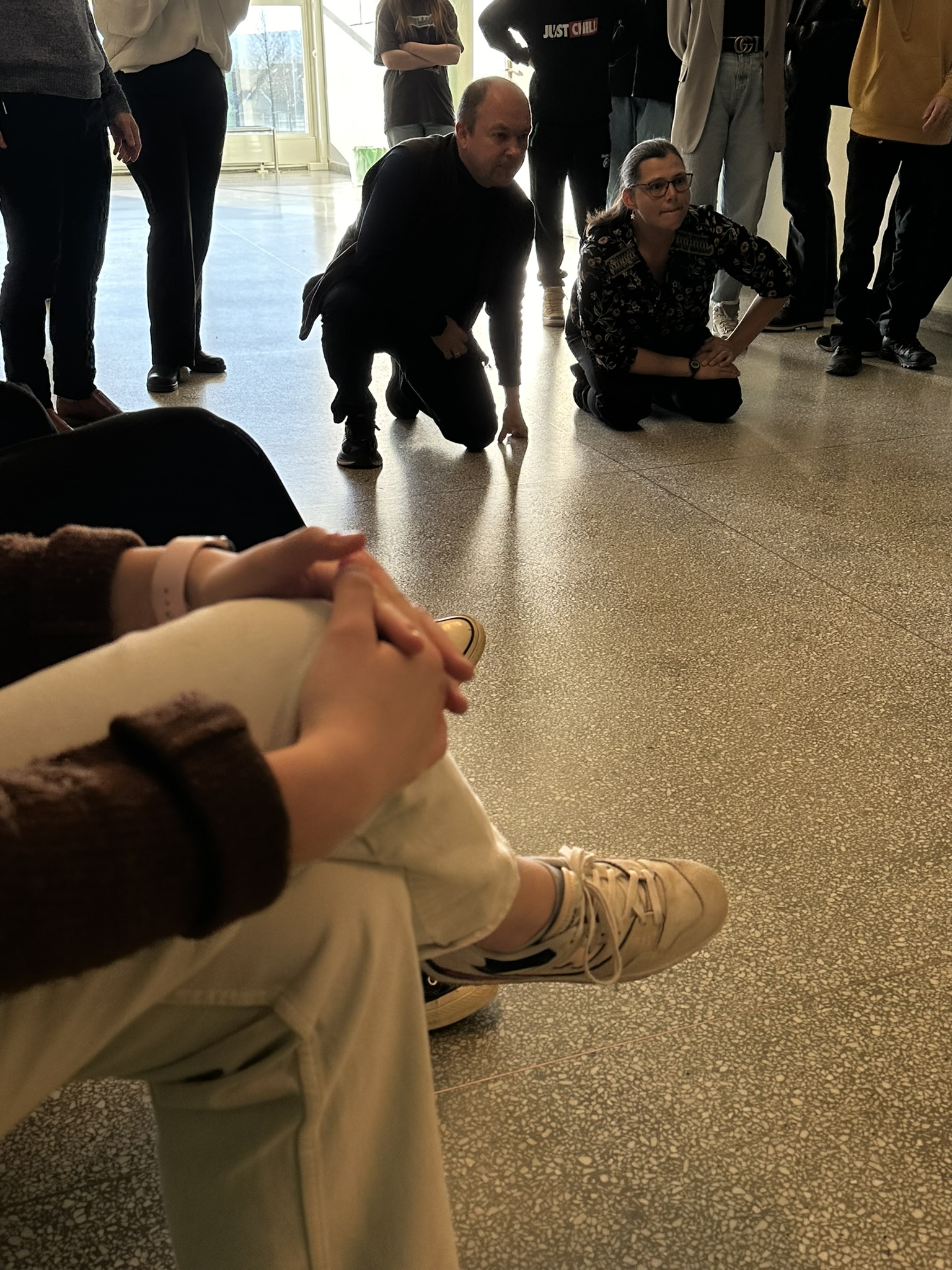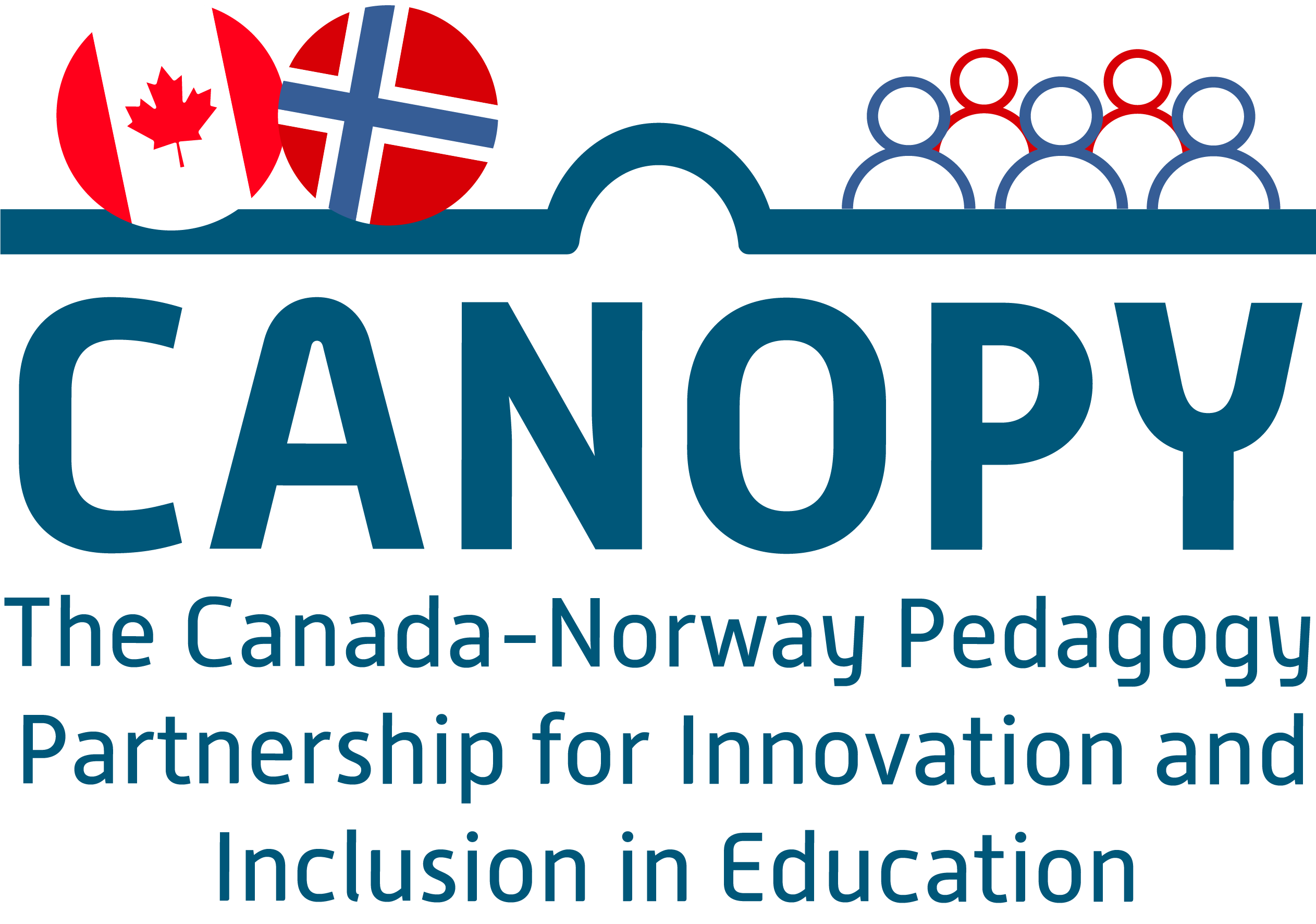The passion for exceptional learners is palpable
On the 4th of March, the 2024 CANOPY partnership group met for the first time in Bodø, Norway. The group consisting of 14 members with a passion for exceptional learners will focus on this theme throughout the year. As always, they meet twice in person – once in Norway (March) and once in Canada (November). During these seminars, they learn from and about each other and the country they are visiting, resulting in engaging conversations, research ideas and great questions.

Meeting for the first time…
The first day started with coffee and mingling – creating space for casual talking, breaking the ice and getting to know each other a bit before officially opening the first partnership seminar of 2024. Some a bit jet lagged, but all very excited to meet in person. Prior to this day, the members only met virtually, and several stated that it was nice to finally be in the same room.
The Dean of the Faculty of Education at Nord University, Rose Marting, along with Morten E. Edvardsen (CANOPY project leader) wished everyone a warm welcome and kicked off the seminar.
I felt totally at home when Morten began with “We believe, we have to believe parents send us their best child every day. I we don’t, who do you think they send? Inclusion is not a tool”. This opening set the tone for the week of sharing and learning! – Michele McGrath, superintendent of Education for ALCDSB
…and breaking the ice
 Project Administrator Mona Saxeide stated that “for the first time in CANOPY history, we’re actually ahead of schedule, so we’re going to do an icebreaker activity for you to get to know each other a bit better before we continue with the program”. With all the Canadians on one side of the table and all the Norwegians on the other side, one Canadian and one Norwegian were in a “speed dating” situation, given 5 minutes to talk before the Canadians moved one seat down and met a new Norwegian.
Project Administrator Mona Saxeide stated that “for the first time in CANOPY history, we’re actually ahead of schedule, so we’re going to do an icebreaker activity for you to get to know each other a bit better before we continue with the program”. With all the Canadians on one side of the table and all the Norwegians on the other side, one Canadian and one Norwegian were in a “speed dating” situation, given 5 minutes to talk before the Canadians moved one seat down and met a new Norwegian.
The “speed dating” activity was a great hit amongst the members. It was an incredibly effective way to kickstart their connections to each other by learning about some of their interest points, such as research, different projects, as well as experiences. Others mentioned that it was a great way to ensure everyone got to speak with someone they didn’t know, and the fact that everyone was doing it at the same time, it created a safe and good atmosphere when they spent time getting to know each other – it made it easier for later discussion. The activity also laid the groundwork for a more relaxed setting afterwards and made it easier for later discussions.
I loved the speed dating activity as it gave me the chance to talk to everyone and learn more about their research, different projects, and experiences – Liz Arminen, 2nd year ConEd student at Queen’s University
Starting the seminar with the speed dating activity was a very effective icebreaking activity – Chelsea Lam, 3rd year ConEd student at Queen’s University
also enjoyed the speed dating because it pushed me out of my comfort zone and broke the ice for a lot of us – Marissa Little, 3rd year ConEd student at Queen’s University
Presentations
One of the key parts of the CANOPY Partnership Seminar is the presentations and subsequent discussions. During the presentations, the members learned about each others teacher education models, continuing education for teachers, the two countries’ contexts and ongoing projects at both universities.
Because of their presentations, right from the first day I was focused on potential collaborations and building on our existing partnership – Dr. Lindsay Morcom, Associate Dean of Graduate Studies at Queen’s University
Discussing the two contexts from the outset helped set the tone for the seminar. The group realized during this time that the language they use to describe inclusion varies slightly and during the discussions they were able to clarify important terms. It was also helpful to compare our two countries’ policy environments and created important context for the school visits.
I really appreciated how both of these (the Norwegian context and the Canadian context) presentations were back-to-back with each other because it allowed for a more effective contrast between the two – Marissa Little, 3rd year ConEd student at Queen’s University
Some of the students stated that they were surprised about the difference between Norway and Canda in terms of how one is trained to work with exceptionalities and that Norway is way more rigid in the sense that one must take a formal education at a university or university college (although many teachers work with exceptionalities without formal training), whereas in Canada it’s possible to acquire competence outside an institution.
The VOICES project (Nord University), presented by Professor Natallia B. Hanssen, is a project which develops a new course for Intercultural Competence to better prepare teachers education students to their modern Norwegian workplace – a multilingual classroom with an increasingly diverse pupil population. This presentation challenged professor Lindsay Morcom’s to move away from a deficit or pathologizing view of “exceptionality” to include immigrants and others who are learning the language of instruction as their second language. It also made one of the students, Charlotte Opdahl, wishing that the program could also be available for all students and not only for those enrolled in the special needs pedagogy course at Nord University.
She (Professor Hanssen) highlighted that the multilingual classroom is growing, and that all teachers are affected by it – Charlotte Opdahl, 2nd year MAGLU student at Nord University
I was so impressed with the VOICES model and project as a whole, and would love to see more projects that use this type of model. I certainly think our students at Queen’s (and most Universities) would value a course like this, and I am interested in hearing about opportunities for more expansion – Ian Matheson, Associate Professor of Special Education at Queen’s University
I learned a lot about VOICES, which I find really interesting, as it connects with what we do at Bankgata – Katrine Lekang Eiterjord, teacher at Bankgata Middle School
The Add*Ed Research Group at Queen’s University is focused on conducting and promoting research, innovation, and engagement related to special and inclusive education for students with autism and other developmental disabilities. The presentation showed an excellent example of how mentorship can work in a faculty of education. The group clearly spoke to how they have worked with schools in the interest of serving teachers’ needs, and also about how the group prioritizes the development of graduate and undergraduate students alike.
I loved the introduction of Add Ed lessons, and I think there is great possibilities in collaborations on some common activities with students across programmes in digital meetings and forums – Bent-Cato Hustad, Associate Professor at Nord University
The Add-Ed research project was also very interesting to hear about. I’m particularly impressed that they’ve used this research to create resources for anyone in the field of education so they can share and ask questions and receive the newest research. I wish we had something similar in Norway – Charlotte Opdahl, 2nd year MAGLU student at Nord University
The Canadian group visited three schools during their week in Bodø – Alberthaugen School, Bankgata Middle School and Løpsmark School. Three different school which warmly welcomed the group to their school.
Alberthaugen school
Alberthaugen was a great start. It allowed the group to see a special-not-special school in operation, and it was a great chance to hear from the students and teachers (and principal) about what they felt was most important about the model. Two of the students in the 10th grade presented about the school, as well as answering most of the questions the Canadians asked.
The students were candid and very mature – I was particularly impressed by how they discussed the challenges they’d had (e.g., behaviour) and how they had valued aspects of the program (working days, free days following 20 consecutive attendance days, trips) – Ian Matheson, Associate Professor of Special Education at Queen’s University
I loved visiting Alberthaugen School and seeing how the teachers/principals formed amazing relationships with the students – Liz Arminen, 2nd year ConEd student at Queen’s University
Both students did extremely well- their English was fantastic and very well-spoken. I think hearing about the school’s impact on the boys from their own perspective was really valuable because you could tell that they really respected their teachers and were grateful for getting to learn in that environment – Marissa Little, 3rd year ConEd student at Queen’s University
The work of the staff to meet the needs of students who typically were not attending or engaged in school is life changing. I loved the out of the box thinking to create an alternate learning environment for at risk students. The structured environment with such firm boundaries allow students to have life long skills in organization, perseverance and increased self esteem – Michele McGrath, superintendent of Education for ALCDSB
Bankgata Middle School
 The school building was described as beautiful as it had lofts of light wood and natural light, as was filled with student-made art. It was evident that the teachers and principal strive to create an inclusive environment for all students. The facilities were also much more well-equipped than Canadian facilities, where the pottery wheels and a ceramics oven was mentioned as examples. The Canadians left with an impression that the staff was incredible at sharing the culture that exists in the school to support inclusion and students with special needs. At the end of the visit, the group sat down with the principal and one of the teachers (as well as Katrine L. Eiterjord) and were given lots of time to ask questions about particular parts of the school, such as the absentee program.
The school building was described as beautiful as it had lofts of light wood and natural light, as was filled with student-made art. It was evident that the teachers and principal strive to create an inclusive environment for all students. The facilities were also much more well-equipped than Canadian facilities, where the pottery wheels and a ceramics oven was mentioned as examples. The Canadians left with an impression that the staff was incredible at sharing the culture that exists in the school to support inclusion and students with special needs. At the end of the visit, the group sat down with the principal and one of the teachers (as well as Katrine L. Eiterjord) and were given lots of time to ask questions about particular parts of the school, such as the absentee program.
It was fascinating to see their art displayed throughout the school. I couldn’t help but notice that their art incorporated a wider variety of mediums and textures (like decorative mirrors, lizards, and pottery) compared to what we typically see in Canada, where painting, colouring, and paper-based work are the norm – Chelsea Lam, 3rd year ConEd student at Queen’s University
Løpsmark School
The last school visit was also a very valuable visit. The group started off the visit with about an hour to ask questions to the Principal and VP, which was amazing. The group had acquired so much information at that point, seen many education settings, and so they were well positioned to be able to ask further questions. The tour of the school, both inside and outside, lead Chelsea Lam and Michele McGrath to admire the extent to which the Norwegian education system integrates nature and outdoor education into students’ learning experiences. During the first hour, the group witnessed one of the younger grades getting ready for one of their outdoor-classroom days. Marissa Little described the room as low-stimulating, offering a great environment for the children.
Getting to observe the children during their classes was also awesome and it was so fun to chat with a few of them. It seemed like a fantastic learning environment – Marissa Little, 3rd year ConEd student at Queen’s University
As opposed to earlier in the week when everything was so new to us, we had collectively acquired a solid understanding of how things worked in Norway, and so we could ask specific questions. It was really neat to see the physical spaces in the building and even to get to interact with students and teachers – Ian Matheson, Associate Professor of Special Education at Queen’s University
I saw many different classrooms where I was able to interact with the students. I enjoyed being able to speak to the students and it was a very heartwarming experience seeing how excited they were to have Canadian visitors – Liz Arminen, 2nd year ConEd student at Queen’s University
We asked about 100 questions at Løpsmark school! – Allie Minuk, doctoral student at Queen’s University
The principals really opened the place up for us and we were able to see and experience a typical day. This was really nice – Jordan Shurr, Associate Professor of Special Education at Queen’s University
After lunch on the last day, the full group was divided into smaller groups and were given the task to look forward – both to the next meeting in November and also to discuss potential collaborations. During these hours, the group got a better chance to connect and discuss different areas of interest and chatting in smaller groups was really effective. The planning session gave lots of opportunities to decide on some key goals for future work as a partnership. The loose structure that the afternoon provided was appreciated as it gave them a path for contributing to planning, but also allowed time for conversation that veered from just that.
It was especially exciting to start developing concrete plans for our future avenues for collaboration in both research and education – Marina Prilutskaya, Head of Division – Pedagogy and Special Needs Education at Nord University
I am excited about the prospect of collaborating on future courses to better prepare our teacher candidates to support students with a wide variety of needs. Some of Nord’s courses go into detail in areas that ours might not (e.g., communicating with parents), so I look forward to learning more about this – Allie Minuk, doctoral student at Queen’s University
It really drove home to me the importance of having students involved – I was greatly impressed by their maturity and knowledge and I hope that their participation allowed them to all see how well they would be able to do in graduate studies and research – Lindsay Morcom, Associate Dean of Graduate Studies at Queen’s University
The full group will meet for the second time in Canada the first week in November, continuing with the ideas and possible collaborations they initiated during the first meeting and virtually between the March and November.
The programme contained several presentations and activities not mentioned in this article. The full programme can be viewed here: CPS program Bodø
